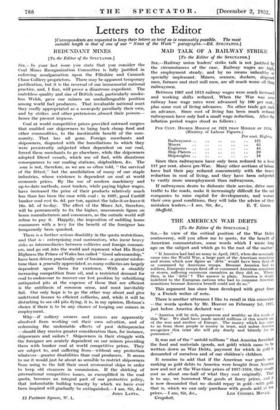Letters to the Editor
[Correspondents are requested to keep their letters as brief as is reasonably possible. The most suitable length is that of one of our " News of the Week " paragraphs.—Ed. SPEcraroa.] REDUNDANT MINES [To the Editor of the SPECTATOR.] SIR,—In your last issue you state that you consider the Coal Mines Reorganization Committee is fully justified in enforcing amalgamation upon the Fifeshire and Cannock Chase Colliery proprietors. There may be apparent temporary justification, but it is the reversal of our immemorial national practice, and, I fear, will prove a disastrous expedient. The matchless quality and size of British coal, particularly smoke- less Welsh, gave our miners an unchallengeable position among world fuel producers. That invaluable national asset they coolly appropriated as a monopoly peculiarly their own, and by strikes and other pretensions Abused their poWers- hence the present impasse.
Coal at world competitive prices provided outward cargoes that enabled our shipowners to bring back cheap food and other commodities, to the inestimable benefit of the com- munity. That has all gone. Foreign merchants and Aipowners, disgusted with the humiliations to which they were persistently subjected when dependent on our coal, forced these merchants to go elsewhere, while the shipowners adopted Diesel vessels, which use oil fuel, with disastrous consequences to our coaling stations, shipbuilders, &c. The ssue is not, therefore, as we are so often told, " the survival of the fittest," but the annihilation of many of our staple industries, whose existence is dependent on coal at world economic prices. By the use of modern machinery and up-to-date methods, most traders, while paying higher wages, have increased the price of their products relatively much less than has been the case with coal : in 1897, good Cardiff bunker coal cost Os. 6d. per ton, against the take-it-or-leave-it 16s. 6d. of to-day. The effect of the Mines Act, therefore, will be permanently to fix the higher, uneconomic figure on home manufacturers and consumers, as the outside world will refuse to pay it. Happily, the imposition of saddling home consumers with a levy for the benefit of the foreigner has temporarily been quashed.
There is a further serious disability in the quota restrictions, and that is : enterprising coal contractors, who incur heavy risks as intermediaries between collieries and foreign consum- ers, and go out into the world and represent what His Royal Highness the Prince of Wales has called " Good salesmanship," have been driven practically out of business—a greater misfor- tune than s generally appreciated, as many collieries are largely dependent upon them for existence. With a steadily increasing competition from oil, and a restricted demand for coal to endeavour to recover our lost position by subsidizing antiquated pits at the expense of those that are efficient is the antithesis of common sense, and must inevitably fail. Our only hope is to go the other way about and give .unfettered licence to efficient collieries, and, while it will be disturbing to see old pits dying, it is, in my opinion, Hobson's choice if there is to be any chance of keeping our, miners in employment.
Why—if colliery owners and miners are apparently absolved from working out their own salvation, and of redeeming the undeniable effects of past delinquencies —should they receive greater consideration than, for instance, shipowners and sailors ? Shipowners in their struggle with the foreigner are acutely dependent on our miners providing them with bunker coal at world competitive prices. They are subject to, and suffering from—without any protection whatever—greater disabilities than coal producers. It seems to me it would just be about as sensible to restrict shipowners from using to the full their most economical ships in order to keep old steamers in commission. If the shirking of international competitive issues, as exemplified in the coal quota, becomes an integral part of our protective policy, that indomitable bulldog tenacity by which we have ever been inspired will gradually be extinguished.—I am, Sir, &c.,
JouN LATTA.
12 Portman Square, W.1.










































 Previous page
Previous page